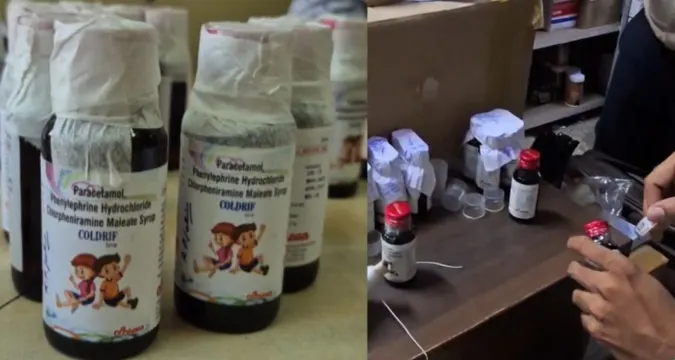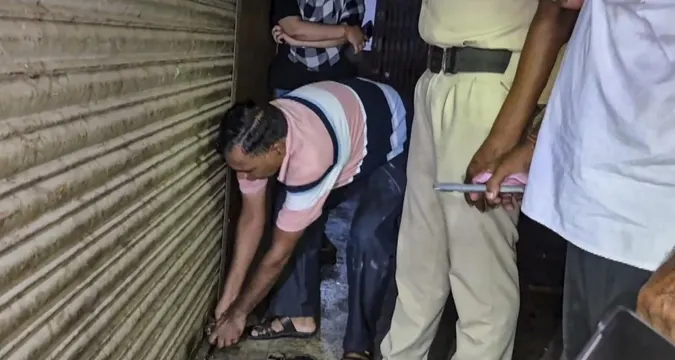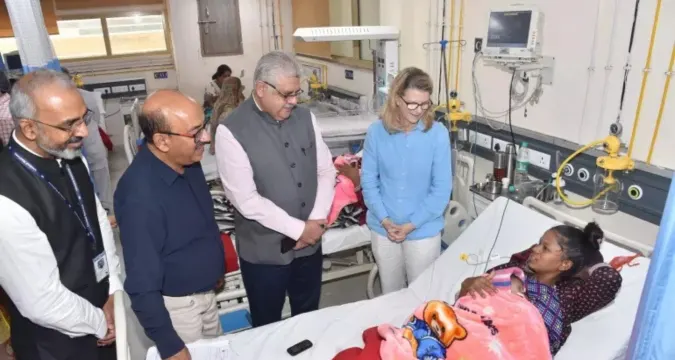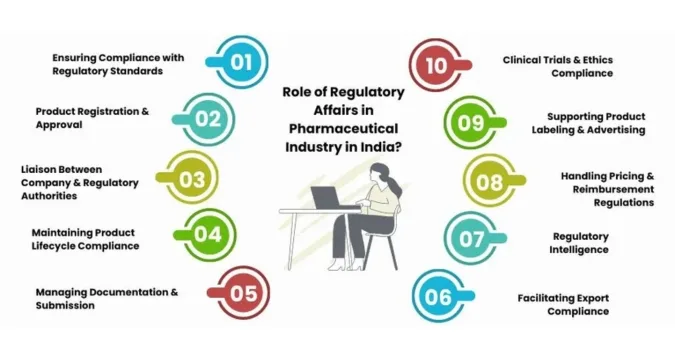Coldrif Tragedy: Anatomy of a Dangerous Syrup, the Arrest, and the Fight for Accountability
A National Wake-Up Call
The ongoing Coldrif tragedy has revitalized the pharmaceutical ethics, regulatory policies and the price of negligence debate in Indian health. At least twenty-one of them died, predominantly of children, in Madhya Pradesh, and the detention of the owner of the poisonous cough syrup-producing factory in Chennai makes one of the darkest milestones in one of the most alarming medical safety follies in India this year.

What started as a local investigation concerning unpleasant child deaths within Madhya Pradesh has turned out to be a countrywide inquiry that has not only exposed the weaknesses of the drug manufacturing chain, flaws of state surveillance, and uncanny nature of similar fates that have unfortunate India its drug credibility on the international level.
The Tragic Timeline
The crisis came into play when the health officials of Morena, a district of Madhya Pradesh, observed a series of child deaths that shared the same feature they all had taken part in taking the cough syrup, Coldrif. The syrup which was marketed as an easy remedy against cold and cough, proved to be mankillingly poisoned with diethylene glycol (DEG), a very poisonous, yet common solvent and antifreeze solvent creating industrial solvents.
The outcome of the autopsy reports confirmed kidney failure and destruction of multiple organs which were in line with the poisoning by DEG. Anxious parents and unresponsive children started flooding the hospital wards within a few days and the district authorities had to immediately stop selling the product.
The problem became bigger than a local health problem when initial tests conducted by state laboratories revealed contamination. The media attention turned into the manufacturer itself, a pharmaceutical company with its head office situated in Chennai that had been distributing Coldrif to some of the states of the north.
The Arrest That Followed
This reached its lowest point when the owner of the company was arrested by the Tamil Nadu police on the charges of negligence, culpable homicide, and criminal violation of the Drugs and Cosmetics Act. Primary investigations showed that the batch of Coldrif syrup provided to the company had evaded a number of required quality checks.

As senior investigating officials state, the batch failed to meet the required safety standards and key documentation was simply absent or was falsified. Apprehensively high contents of diethylene glycol and ethylene glycol (neither of which is consumable by human beings) could be traced in samples that were taken at the production plant.
The arrest marks not only as a measure of personal responsibility but also as a symptom of a weakness in the pharmaceutical manufacturing system in India, especially concerning small and mid-scale drug manufacturers (that, in many cases, fall within regulated black market areas).
A Chemical of Death: The Knowledge of Diethylene Glycol
Diethylene Glycol Diethylene glycol is a colourless sweet tasting substance that is widely used in areas of the industry as a component of the braking fluid, lubricant, as well as as a raw material in manufacturing plastics. It is virtually always present in the form of adulteration or substitution in consumable medication i.e. a cost cutting malpractice of selling pharmaceutical grade glycerin as industrial grade chemicals.
DEG is highly toxic to humans. When it enters the organism, it breaks down into agents that harm the kidneys, liver, and the central nervous system. In its early symptoms, victims (usually children) present with what appears as mild flu, which includes nausea, abdominal pains, and vomiting, but within hours, there is permanent kidney damage due to the toxin.

This is a sad history that was depicted in a number of tragedies including the now notorious 1937 story of the Elixir Sulfanilamide incident in the United States as well as newer incidents in Gambia, Uzbekistan, and India where there were mass poisonings.
The Chain of Failure
According to experts, the Coldrif tragedy did not occur by a singular mistake of manufacturing, but rather it was the outcome of a sequence of regulatory and ethical breakdown. Over 10,000 small scale pharmaceutical industries are spread across the states of India, with many of them manufacturing over-the-counter syrups and antibiotics to serve the local markets. Small and mid-level firms usually undergo fewer audits compared to larger ones since the supervision is more rigid with large companies.
Researchers say that in this instance, the firm could have purchased unverified raw materials with suppliers who have not been verified by the laboratories. The quality control (QC) departments and quality assurance (QA) departments are said to have been malevolent when it comes to the proper documentation of the accepting raw materials and testing in batches.

Even regulatory bodies have fallen under tough criticism. State drug control administration of both Tamil Nadu and Madhya Pradesh have been alleged to conduct reactive inspection as opposed to active surveillance. Although there are occasional surprise checks that have been initiated since the tragedy there is an overriding question: why did not this get uncovered earlier before lives were lost?
Hanging Families Cries Justice
Following the killings, families who have lost relatives in Madhya Pradesh Morena, Shivpuri, and Gwalior districts demand that the culprits be severely punished. To most, justice can only be achieved by not only arresting the manufacturer, but also bringing to question those authorities who initiated the sale of toxic drugs in the production in the first place.
In a statement, a local father who lost his three year old daughter said that he had bought the syrup in one of the government approved pharmacies. His case is mirrored by dozens of other people who believed that OTC drugs were a safe alternative to prescription drugs in their children.
Local NGOs and patient rights organizations have marshaled legal support to the families that are affected and demanded a trial of culpable homicide under sections of corporate negligence and culpable homicide.
National Response and Government Duty
Central Drugs Standard Control Organisation (CDSCO) has also launched a nationwide sampling campaign of all pediatric syrups produced by the small and medium-sized plants. The Union Health Ministry has ordered the states to implement strict test quality and deter the license of any company that may be proven to be innovative by norms.
Top-level officials have vowed to establish a central digitalized monitoring system to monitor sourcing of raw materials, batch quality and export documents. The program will avoid the type of data-rigging and falsification of records in the Coldrif case.
In the meantime the Madhya Pradesh government offered to redress the families of the victims, but social minds tell that no financial support can mend the hatred caused emotionally by this disaster that can be avoided.
Lessons Unlearned
The same tragedies have been experienced in India. In 1998, dozens of children died of cough syrup spiked with DEG by a Delhi manufacturer. In 2020, another such contamination in Jammu and Kashmir took away several lives. Every time temporary indignation, official investigations, and promises of reform- but it is easy to forget with time.
Without creating a culture of preventive vigilance and not one of near miss, India will be infested with such tragedies again and again, unless they learn to counter health disasters with attention to safeguarding instead of responding to them, warns health experts. Whenever a child dies of avoidable contamination, it becomes a failure of morals and administration, according to one of the senior toxicologists working with the ongoing investigation.
Global Ripples
Coldrif tragedy also jeopardizes the pharmaceutical reputation of India on the international platform. Almost 60% of the global generic drugs are produced by Indian firms, and the exports of such drugs have covered more than 200 countries. Any violation of local manufacturing ethics has an upshot in the global market and will face a tighter check by world regulators.
The problem of contamination of the exported syrups has already caused the importation ban in some of the African and Asian countries in recent years. This recent tragedy possibly may overload confidence unless India places an established transparent and enforceable quality assurance adjudication by which export and domestic drugs are subjected to an equivalent consideration.
The Road to Accountability
According to legal experts, the Coldrif case may make it to the books of pharmaceutical jurisprudence in India. When charged to the full working law, this may redefine the liability of the makers of drugs and the regulatory authorities in the cases of death caused by drugs.
Civil societies are also demanding the amendment of the Drugs and Cosmetics Act to incorporate the story of corporate manslaughter in case of contamination proven to be deadly. This would enchain the corporate director and quality control head on direct criminal liability, which could not be circumvented by monetary fines.

Beyond Blame: The Moral Question
The tragedy of Coldrif at its best raises the question to India as to where ethical concerns supersede profit maximization, where does the guilt lay? The small gains that are made because safe foodstuffs were replaced by the industrial foods are taken at the cost of innocent children.
This brings up unpleasant concerns regarding the culture of compliance in the pharmaceutical industry in India. Is auditing a real thing, or just a form of paperwork? Do regulating authorities really work, or are they cowered by political and commercial interests? And above all, what can be rejuvenated in India in general and in medicine specifically? What can be restored in India and in medicine to make the world trust it?
Rebuilding Trust
The answers are not just arrests or factory closing as implementation of a clear, responsible, more scientifically sound drug regulatory system. However, periodic and voluntary auditing of third parties, traceability, embracing blockchain in the tracking of raw materials, and making the results of batches publicly accessible may transform the control.
Even public awareness has to change. The consumers must insist on verifiable information about medicines they are buying. There should be the training of doctors and pharmacists to detect suspicious drugs and report them whenever they find them.
A Tragedy Not to Go Round and Round
The coldrif tragedy did not just end lives but also trust. It has also left India with no choice but to look into the integrity of their pharmaceutical system and the morals behind it. As the police slowly construct the form of guilt, it is clear that there is only one definite thing, and it is not some natural disaster or a terrible oversight. It was a tragedy of errors, made by people, caused by greed, carelessness and indifference.
When India actually seeks to become the pharmacy of the world, then each of the thousand lives lost to its carelessness should be a lesson to it, a section of the road that shall never be crossed again.








